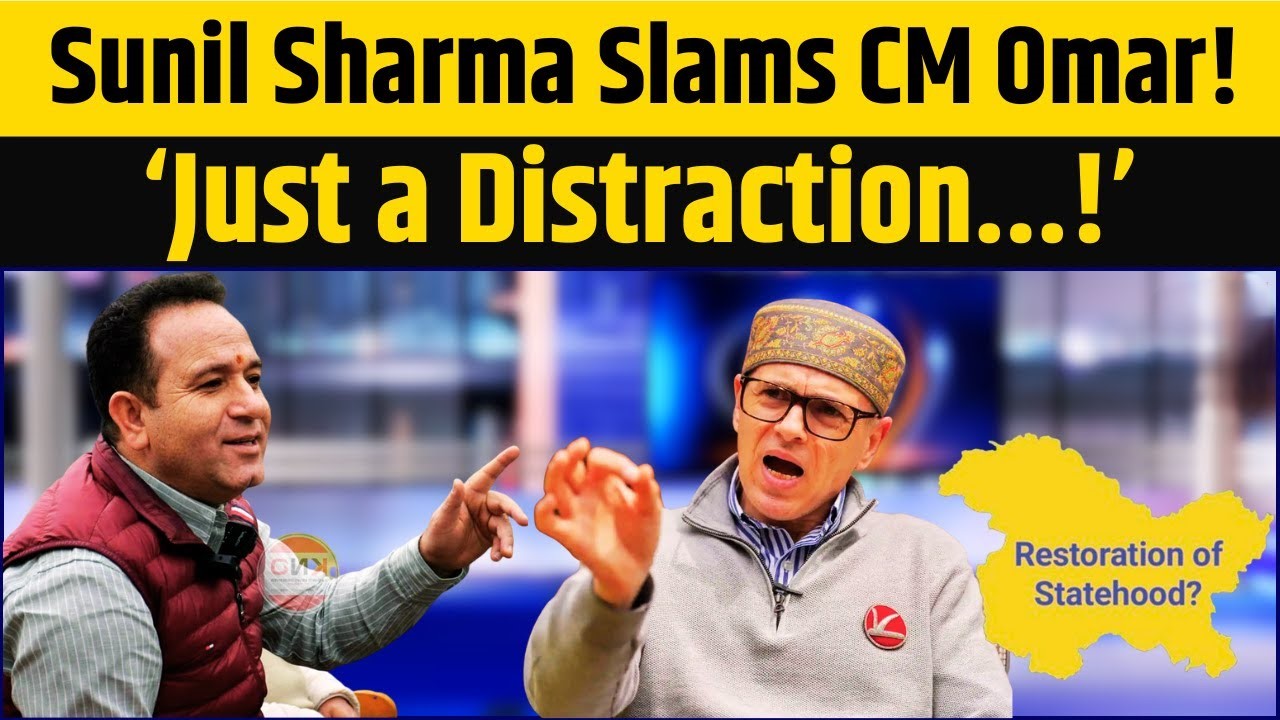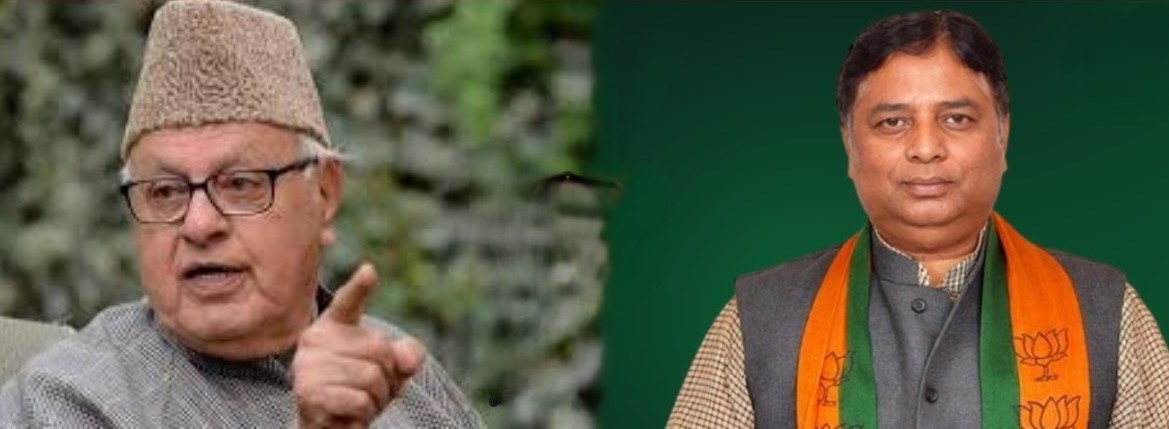Article 370 and Statehood in Jammu & Kashmir: Sunil Sharma Tells Omar Abdullah to “Forget the Past”
By: Javid Amin | 31 July 2025
The Political Fault Lines in Jammu & Kashmir Reignite
The simmering debate over the political future of Jammu & Kashmir flared up again after Sunil Sharma, the Leader of the Opposition in the J&K Assembly, launched a pointed critique of Chief Minister Omar Abdullah. Accusing Omar of playing “word games” by linking the idea of “dignified statehood” with the now-abrogated Article 370, Sharma didn’t mince words: “Article 370 is buried. There’s no turning back.”
His statement has reignited a broader discourse—on what statehood should mean post-2019, whether any return to special status is constitutionally or politically viable, and how the region’s aspirations align with New Delhi’s evolving vision for Kashmir.
Understanding Article 370 and Its Emotional Legacy
Before diving into the controversy, it’s important to revisit what Article 370 stood for. Enacted in 1949, it granted Jammu & Kashmir a special status within the Indian Union, allowing the region its own constitution, laws, and considerable autonomy—except in defense, foreign affairs, and communications.
To many Kashmiris, Article 370 was not merely a legal provision but a symbol of identity, autonomy, and a unique political contract between the state and the Union of India.
But to others, particularly nationalists and the BJP, it was a temporary clause that stifled integration and fostered separatism.
On August 5, 2019, the BJP-led government under Prime Minister Narendra Modi revoked Article 370, bifurcated the state into two Union Territories (Jammu & Kashmir and Ladakh), and brought sweeping constitutional changes.
While the move was celebrated as a “historic correction” by some, it also triggered widespread resentment and a profound political vacuum—one that still defines the discourse.
Sunil Sharma’s Position—A No-Nonsense Stand on Statehood
Sunil Sharma’s latest remarks are emblematic of the BJP’s hardened stance.
“Article 370 is gone, it’s buried. There is no question of dignified statehood being linked to it,” Sharma stated bluntly.
For him and his party, statehood is negotiable—but only if it’s not anchored in the past. Sharma’s message to Omar Abdullah was unequivocal: “We can talk about restoring statehood—but not if it involves any demand for Article 370.”
This conditional openness presents a nuanced but clear ideological position: yes to administrative restructuring, no to constitutional rollback.
Omar Abdullah’s Call for Dignified Statehood—A Historical Pitch
Omar Abdullah, the National Conference leader and former CM, has consistently framed the abrogation of Article 370 as unconstitutional and a betrayal of the people’s trust.
By linking “dignified statehood” to the restoration of J&K’s special status, Omar is positioning the National Conference as the custodian of Kashmir’s historical and political identity.
In a recent statement, Omar noted:
“Restoring dignity means restoring what was snatched from us. Statehood with Article 370 is our rightful demand, not a favor.”
For many Kashmiris, this view resonates deeply. But critics, like Sharma, argue that such rhetoric only inflames public sentiment and obstructs forward-looking governance.
Sharma’s Accusations—“Stop Misleading the People”
Sunil Sharma didn’t stop at constitutional arguments. He accused Omar Abdullah and the National Conference of actively misleading the public by glorifying “old slogans” and leveraging historic events to stir emotions.
“They want holidays in Sheikh Abdullah’s name, they romanticize July 13. But what about development? What about jobs? What about youth empowerment?”
This statement frames the ideological battle as one between nostalgia and pragmatism. Sharma is essentially arguing that leaders like Omar are stuck in the past, while the new political reality demands accountability, growth, and inclusive governance.
Statehood on the BJP’s Terms—Development-First
Sharma made it clear that statehood will be restored—but only when the timing is right, and not under pressure from those pushing outdated narratives.
The BJP’s vision for J&K centers around:
-
Improved infrastructure
-
Job creation through industrial corridors
-
Boosted tourism and global investments
-
Empowering panchayats and local governance
-
Neutralizing corruption and nepotism in administration
In short, the statehood they promise is one of economic upliftment, integration, and modern governance—not of special status and separate laws.
Is the “Dignity” Argument Losing Steam?
Critics of the National Conference believe that the repeated emphasis on “dignified statehood” tied to Article 370 is increasingly sounding hollow in the face of developmental aspirations.
Post-2019, there have been some real indicators of progress:
-
Record-high tourist footfall
-
Digital governance initiatives
-
Grassroots elections, including DDC polls
-
Crackdowns on terror funding networks
Though these measures haven’t erased all grievances, they signal a shift in the state’s trajectory—from conflict-centered politics to performance-based metrics.
In such an environment, rhetoric about Article 370 may be losing its persuasive power.
The Battle of Narratives—Identity vs. Integration
At its core, the debate between Sunil Sharma and Omar Abdullah is not just about legal frameworks—it’s about identity versus integration.
-
Omar’s narrative appeals to the cultural memory of Kashmiris and frames the restoration of Article 370 as a battle for justice and identity.
-
Sharma’s narrative is pragmatic: Kashmir should look ahead, embrace change, and stop clinging to a provision that, in his words, “no longer exists.”
This isn’t merely a difference of opinion—it’s a collision of worldviews.
Public Sentiment—A Shifting Landscape?
What does the average Kashmiri think?
The mood in the Valley is complex. There’s visible fatigue with emotional politics and unmet promises. Many young people are more interested in:
-
Job opportunities
-
Educational prospects
-
Internet access
-
Safety and mobility
-
A chance at normalcy
For them, the Article 370 debate may be emotionally potent, but it takes a backseat to everyday survival and opportunity.
Sunil Sharma’s message may resonate more with these aspirations, even as traditional parties struggle to retain ideological ground.
Legal Reality—Can Article 370 Ever Come Back?
From a legal standpoint, the Supreme Court of India upheld the abrogation of Article 370 in December 2023, effectively shutting the door on its return.
Even political experts argue that reviving Article 370 would require constitutional gymnastics unlikely to pass Parliament or judicial scrutiny.
Sunil Sharma’s assertion that “it’s buried forever” is not just political hyperbole—it reflects the current legal reality.
National vs. Regional Agendas—An Unresolved Tension
Sunil Sharma’s remarks spotlight an enduring tension in Indian politics: the clash between national integrationist agendas and regional identity politics.
The BJP has consistently emphasized “one nation, one constitution.” In contrast, the National Conference champions “asymmetric federalism” as the foundation of India’s pluralism.
Both sides have valid concerns:
-
The BJP fears that exceptionalism can fragment the Union.
-
The NC fears that uniformity can erase regional identities.
This debate isn’t just about Kashmir—it’s a litmus test for Indian federalism itself.
Media & Public Discourse—Simplifying Complex Realities
Much of the discourse around Article 370 and statehood has been simplified for soundbites. But what’s at stake is nuanced:
-
Can Kashmir retain its cultural uniqueness without constitutional exceptionalism?
-
Is full integration synonymous with justice, or does it breed further alienation?
-
Can both BJP and NC evolve their narratives to focus on reconciliation, not confrontation?
These are the real questions citizens, not just politicians, must begin to ask.
What Lies Ahead—Beyond Article 370 and Into the Future
The path forward for Jammu & Kashmir doesn’t lie in the past or political point-scoring. It lies in:
-
Transparent and responsive governance
-
Justice for victims of both conflict and misgovernance
-
Empowering youth through education and jobs
-
Rebuilding trust between citizens and institutions
-
Facilitating honest dialogues between opposing political visions
Sunil Sharma’s stance may sound harsh, but it is a wake-up call: the rules of the game have changed, and parties must now innovate, not just reminisce.
Bottom-Line: “Forget Article 370”—A Political Line in the Sand
Sunil Sharma’s warning to Omar Abdullah to “forget Article 370” isn’t just a political jab—it’s a declaration of the ideological battleground ahead of the next elections.
It’s also a test for Omar: will he double down on nostalgia or pivot toward a more grounded political vision that resonates with Kashmir’s evolving realities?
In the coming months, how this debate unfolds could well determine the future of democratic discourse in Jammu & Kashmir—and the legacy of Article 370 itself.



